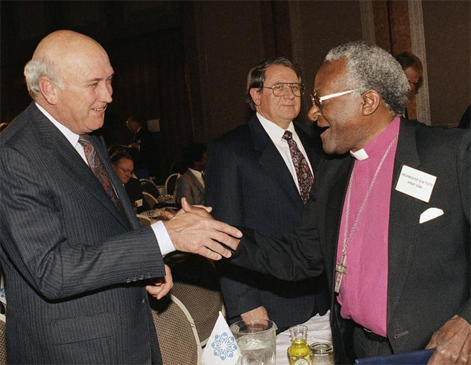|
FILE -
Retiring
Archbishop
of Cape
Town
Desmond
Tutu,
right,
greets
President
Nelson
Mandela
at a
service
in Cape
Town,
Sunday
June 23,
1996
held to
celebrate
the end
of
Tutu's
tenure
as
leader
of the
Anglican
Church
in South
Africa.
Tutu,
South
Africa’s
Nobel
Peace
Prize-winning
activist
for
racial
justice
and LGBT
rights
and
retired
Anglican
Archbishop
of Cape
Town,
has
died,
South
African
President
Cyril
Ramaphosa
announced
Sunday
Dec. 26,
2021. He
was 90.
(AP
Photo/Guy
Tillim,
File) |
|
|
|
|
|
 |
 |
 |
|
|
|
|
|
|
 |
|
|
FILE -
South
African
President
F.W. de
Klerk
left
shakes
hands
with
Anglican
Archbishop
Desmond
Tutu in
Johannesburg,
Sept.
14,
1991.
Tutu,
South
Africa’s
Nobel
Peace
Prize-winning
activist
for
racial
justice
and LGBT
rights
and
retired
Anglican
Archbishop
of Cape
Town,
has
died,
South
African
President
Cyril
Ramaphosa
announced
Sunday
Dec. 26,
2021. He
was 90.
(AP
Photo/John
Parkin,
File) |
| |
Desmond
Tutu,
South
African
equality
activist,
dies at
90
By
ANDREW
MELDRUM
apnews.com
JOHANNESBURG
-
Desmond
Tutu,
South
Africa’s
Nobel
Peace
Prize-winning
activist
for
racial
justice
and LGBT
rights
and
retired
Anglican
Archbishop
of Cape
Town,
has
died,
South
African
President
Cyril
Ramaphosa
announced
Sunday.
He was
90.
An
uncompromising
foe of
apartheid
— South
Africa’s
brutal
regime
of
oppression
against
the
Black
majority
— Tutu
worked
tirelessly,
though
non-violently,
for its
downfall.
The
buoyant,
blunt-spoken
clergyman
used his
pulpit
as the
first
Black
bishop
of
Johannesburg
and
later
Archbishop
of Cape
Town as
well as
frequent
public
demonstrations
to
galvanize
public
opinion
against
racial
inequity
both at
home and
globally.
Tutu’s
death on
Sunday
“is
another
chapter
of
bereavement
in our
nation’s
farewell
to a
generation
of
outstanding
South
Africans
who have
bequeathed
us a
liberated
South
Africa,”
Ramaphosa
said in
a
statement.
“From
the
pavements
of
resistance
in South
Africa
to the
pulpits
of the
world’s
great
cathedrals
and
places
of
worship,
and the
prestigious
setting
of the
Nobel
Peace
Prize
ceremony,
the Arch
distinguished
himself
as a
non-sectarian,
inclusive
champion
of
universal
human
rights.”
Tutu had
been
hospitalized
several
times
since
2015,
after
being
diagnosed
with
prostate
cancer
in 1997.
In
recent
years he
and his
wife,
Leah,
lived in
a
retirement
community
outside
Cape
Town.
Throughout
the
1980s —
when
South
Africa
was
gripped
by
anti-apartheid
violence
and a
state of
emergency
giving
police
and the
military
sweeping
powers —
Tutu was
one of
the most
prominent
Blacks
able to
speak
out
against
abuses.
A lively
wit
lightened
Tutu’s
hard-hitting
messages
and
warmed
otherwise
grim
protests,
funerals
and
marches.
Short,
plucky,
tenacious,
he was a
formidable
force,
and
apartheid
leaders
learned
not to
discount
his
canny
talent
for
quoting
apt
scriptures
to
harness
righteous
support
for
change.
The
Nobel
Peace
Prize in
1984
highlighted
his
stature
as one
of the
world’s
most
effective
champions
for
human
rights,
a
responsibility
he took
seriously
for the
rest of
his
life.
With the
end of
apartheid
and
South
Africa’s
first
democratic
elections
in 1994,
Tutu
celebrated
the
country’s
multi-racial
society,
calling
it a
“rainbow
nation,”
a phrase
that
captured
the
heady
optimism
of the
moment.
|
|
|
|
|
|
|
|
|